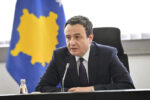A day after Kosovo, U.S. Deputy Secretary of State for Management and Resources, Richard Verma, visited Serbia. In a meeting with Serbian President Aleksandar Vučić, Verma raised the issue of U.S. sanctions against NIS Petrol due to its Russian ownership, stating that the measure was not aimed at Serbia but at Russia. The U.S. State Department sent a message to Vučić that there would be no “regular business” with Russia.
The sanctions imposed by the U.S. Department of the Treasury on 300 Russian entities worldwide, including NIS Petrol in Serbia, were the main topic of a meeting between Richard Verma and Serbian President Aleksandar Vučić on Saturday.
President Vučić confirmed that he wants a sustainable solution and mentioned that during his conversation with Verma, he asked for the deadlines regarding NIS sanctions to be extended.
Vučić added that within the next 10 days, he would engage in talks with the Americans to specify what is included in the sanctions package against NIS, so that he can then engage with the Russians and find a solution. Regarding the sanctions imposed by the U.S. Treasury Department on Russian entities globally, Vučić emphasized that Russia would be hit much harder by other sanctions, in addition to those on NIS.
“We have asked five concrete questions and we expect a written decision in the coming period. First, we need to talk with the Americans for at least another seven to ten days to see exactly what the content of the entire sanctions package is, so that we can then approach the Russians and discuss what to do,” Vučić said.
He added that Verma mentioned the word “removal” when referring to Russian ownership in NIS, while in another sentence, the term “reduction” was used.
“This creates ambiguity, it creates uncertainty for the Russians as well. Today we have received some responses, and I believe that in the coming period, we will hear what is correct, how accurate it is. We are not extortionists, and I am repeating this to the Americans. We will not extort someone’s property, in this case, Russian property. If we have to pay a price, we will pay the price, but we do not intend to seize something,” he said.
Verma stated that the sanctions are aimed at Russia, not Serbia.
“NIS is one of two thousand companies. The goal is to remove Russian ownership from the ownership structure, and we discussed with the president how to make this change in the ownership structure. There will be no economic consequences for Serbia if Russian ownership is removed from the company. By changing the ownership structure, this will help the region have more peace, and as a partner, we will help Serbia introduce diversity in its energy resources and become independent in this regard,” he said at a press conference.
Verma acknowledged that NIS is the most profitable company in Serbia, but emphasized that these profits go to Russia, which finances the brutal aggression against Ukraine and destabilizes Europe and the Balkans, while failing to invest in Serbia’s future.
The U.S. State Department has once again responded after President Vučić’s statements, in which he referred to the U.S. sanctions on Serbia’s Oil Industry, NIS, as “severe and serious.” According to the U.S. Department of State, there is no “regular business” with Russia. The U.S. Treasury emphasized that it has sanctioned the Russian state-owned companies Gazprom Neft and Surgutneftegas.
NIS was sanctioned as a “secondary risk” because of its ties to Russian Gazprom.
In a response to Radio Free Europe (RFE), the U.S. State Department confirmed that the U.S. is committed to preventing Russia from generating revenue and blocking procurement and financial networks used by Moscow to support its war against Ukraine.
“We will continue to take all appropriate actions to advance accountability for those enabling or profiting from Russia’s illegal war and to prevent Putin from using energy as a tool of coercion,” the State Department said in its response.
NIS is the only company in Serbia engaged in the exploration, production, and processing of oil and natural gas.
According to NIS’s data, Gazprom Neft owns 50 percent of NIS’s share capital, Serbia holds 29.87 percent, while Gazprom holds 6.15 percent. The remaining shares belong to citizens, employees, former employees, and other smaller shareholders.
Gazprom Neft has been under European and U.S. sanctions since 2014 due to Russia’s annexation of the Ukrainian Crimean Peninsula, and the company has been barred from accessing EU and U.S. markets.
NIS operates over 400 fueling stations in Serbia and the surrounding region, including Bosnia and Herzegovina, Romania, and Bulgaria.







